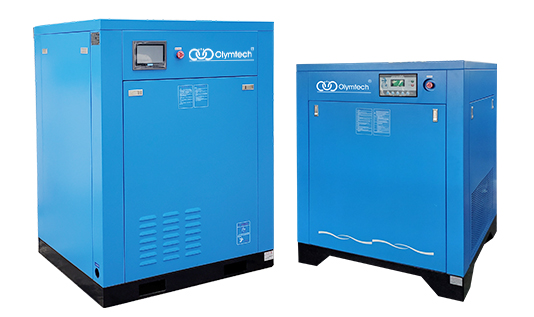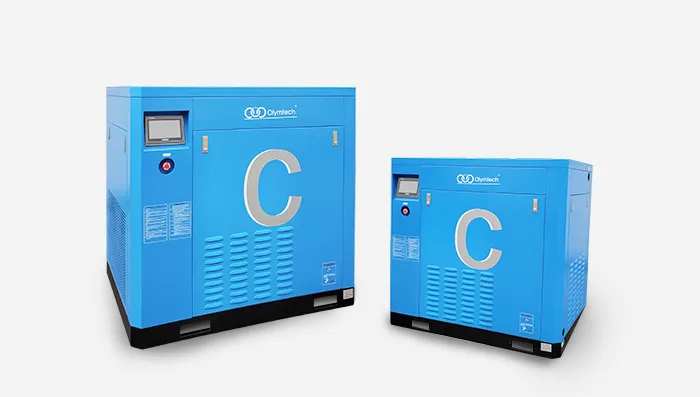Compressors are essential components in many industries, providing pressurized air to power various tools, machinery, and equipment. From manufacturing plants to workshops, compressors are critical to ensuring the smooth operation of air-powered systems. However, selecting the right compressor type for your needs can significantly impact operational efficiency and cost-effectiveness.
Two main types of compressors exist: fixed speed and variable speed. Understanding the key differences between them is crucial in making an informed decision that will maximize productivity while minimizing energy usage and maintenance costs. Each type has distinct advantages depending on the application, and choosing the wrong one can lead to inefficiencies and higher expenses.
A fixed speed screw air compressor operates at a constant, predefined speed. Once powered on, the motor runs at full capacity, regardless of how much compressed air is needed. It either runs continuously or cycles on and off to maintain pressure in the air storage tank.
Constant Speed: Whether air demand is high or low, the motor always runs at the same speed, delivering air at full capacity.
On/Off Operation: The compressor shuts off completely when the desired pressure level is reached and turns back on when pressure drops.
Simpler Technology: Fixed speed air compressors have a simpler design, which often translates to lower upfront costs and easier maintenance.
Consistency for Steady Demand: They are ideal for operations that require a constant supply of air, where demand doesn't fluctuate significantly.
Higher Energy Consumption: Since the motor runs at full capacity even when less air is needed, a fixed speed compressor can waste significant amounts of energy during low demand periods.
Frequent Start-Stop Cycles: In situations with varying air needs, the compressor may frequently start and stop, which increases mechanical wear and shortens the machine’s lifespan.

A variable speed compressor (also known as a VSD screw air compressor) adjusts its motor speed to match the required air demand. Instead of running at full power all the time, it modulates the speed based on the amount of air needed at any given moment. This allows it to run more efficiently when air demand fluctuates.
Adapts to Demand: The motor speed increases or decreases depending on how much air is needed, resulting in optimized performance.
Partial Load Operation: The compressor can operate at partial capacity, reducing energy consumption during periods of low demand.
Energy Efficiency: One of the most significant advantages of a VSD compressor is its ability to save energy. By adjusting the motor speed, it only uses the necessary power, leading to lower energy bills over time.
Reduced Wear and Tear: Because the motor doesn’t constantly start and stop or run at full speed, variable speed compressors experience less mechanical stress, extending their operational life.
Higher Initial Cost: Variable speed air compressors typically have a higher upfront cost due to their more advanced technology.
Complexity: The more sophisticated components of a VSD compressor may require specialized maintenance and could be unnecessary for operations with steady air needs.

Fixed speed compressors consume the same amount of energy whether the air demand is high or low, leading to energy waste during periods of low demand. On the other hand, variable speed compressors adjust their energy usage based on demand, making them far more energy-efficient, especially in environments where air needs fluctuate.
The higher energy consumption of fixed speed compressors often results in higher long-term operating costs. While variable speed compressors may have a larger initial investment, their ability to save on energy bills over time makes them more cost-effective in the long run.
Variable speed compressors excel in environments where air demand changes frequently. By adjusting their output to meet the exact need, they prevent overproduction of compressed air and reduce wasted energy. Fixed speed compressors, on the other hand, are more suited to environments where air demand remains constant throughout the day.
Because fixed speed compressors operate at full speed or cycle on and off, they experience more wear and tear, which may lead to frequent repairs and a shorter lifespan. In contrast, variable speed compressors experience smoother operation, reducing the frequency of maintenance and increasing the longevity of the machine.
Fixed speed air compressors are a great choice for businesses with steady, predictable air demand. If your operation consistently requires the same amount of compressed air throughout the day, a fixed speed compressor offers a simpler and more affordable solution. Additionally, for small-scale operations or businesses with limited budgets, the lower initial cost of a fixed speed compressor can be an attractive option.
For businesses with fluctuating air demand, a variable speed air compressor is the better option. These compressors are particularly useful in industries such as manufacturing, food processing, and automotive where air needs change frequently. Although they require a higher upfront investment, the long-term energy savings, lower maintenance costs, and increased operational flexibility make them ideal for energy-conscious operations.
The primary differences between fixed speed and variable speed air compressors revolve around energy efficiency, operating costs, and suitability for different types of air demand. Fixed speed compressors run at a constant speed, making them suitable for consistent air needs, but they tend to waste energy when demand is low. Variable speed compressors, on the other hand, adjust their speed to match demand, saving energy and reducing wear and tear.
Choosing between a fixed speed and variable speed air compressor ultimately depends on your specific operational requirements. If your air demand is constant, a fixed speed compressor can offer a simpler, cost-effective solution. However, if you experience fluctuating air needs or prioritize energy efficiency and long-term cost savings, a variable speed compressor will be the better investment.
By continuing to use the site you agree to our privacy policy Terms and Conditions.